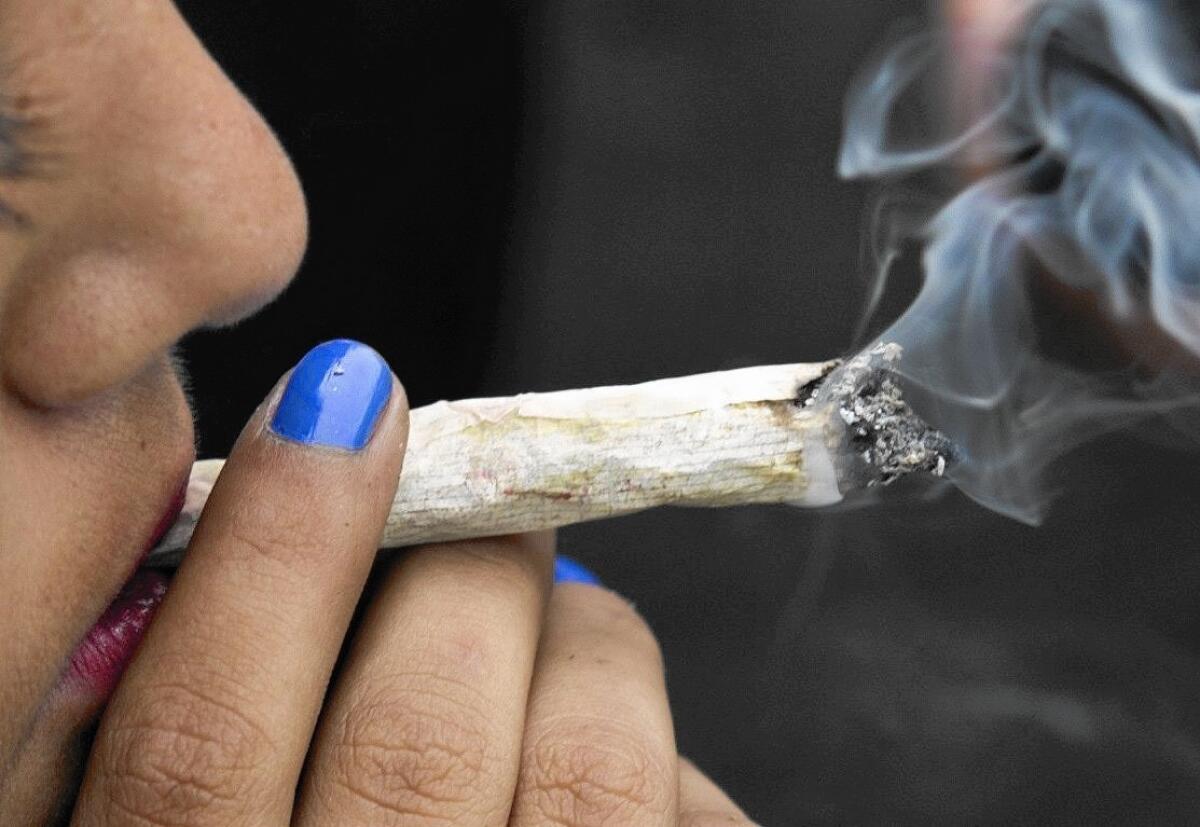Capitol Journal: ‘Recreational’ marijuana proponents are pushing a false narrative

The weed warriors are back, peddling pot for the California ballot. And one old tale they’re spinning is pure bunk.
It’s that too much tax money, cop time and jail space are wasted corralling and incarcerating marijuana users.
Maybe that was true decades ago. But today it’s a myth. No one gets busted and jailed for merely smoking a joint.
See the most-read stories this hour >>
Anyone who’s caught possessing less than an ounce of marijuana — about a sandwich baggie-full — is, at worst, cited for an infraction and pays a fine, like for a traffic ticket.
If you’re illegally trafficking — possessing a load for sale or hawking the drug — it can be either a misdemeanor or felony.
But in California, using marijuana to get a buzz has been decriminalized since the mid-1970s. Young Jerry Brown signed that bill the first time he was governor.
“I’m not aware of any [state or local] law enforcement agency — large, medium or small — chasing down people for smoking pot,” says Chula Vista Police Chief David Bejarano, president of the California Police Chiefs Assn. “None has the time or the staff. It’s not a high priority.”
The only situation in which a weed toker would even be issued a citation, he says, is when cops are called because of a public disturbance.
Federal agents, of course, have their own rules that California voters and the state Legislature can do nothing about. Only Congress can. The feds still consider marijuana use a crime.
That may create public confusion. But hardly anyone is locked up in California prisons or county jails on any type of marijuana sentence — whether for stashing bushels or large-scale trafficking.
In prisons, only about three-tenths of 1% of the total inmate population is incarcerated for a marijuana offense.
Of total California felony arrests last year, according to the state attorney general, just 3% were on any marijuana charge. And for misdemeanor arrests, it was less than 1%.
But still, ending the “failed drug war,” focusing on the “real criminals” and “unclogging the courts” is one of the pot pushers’ favorite arguments, no matter how rooted in falsehood.
Another grating, disingenuous spin — one bought into by much of the media — is that we’re talking about “recreational” use. It’s a cynical abuse of English.
Recreational? Like jogging, hiking or tennis? We’re linking these healthy activities with sucking on a joint?
Drink too much booze, you get drunk. You’re not recreating. Imbibe responsibly and you’re a social drinker. Maybe ingesting marijuana should be called social toking.
Is marijuana bad for your health? “Yes,” says Dr. Donald Lyman of Sacramento, a retired physician and former board member of the California Medical Assn.
“People do not use it to make themselves healthier. They use it to deal with other problems. It is a dangerous and ill-advised substance. That’s why it has to be under control.”
That’s the twist here. Lyman is co-leading a push to qualify a marijuana legalization initiative for the 2016 California ballot. His measure, the doctor says, would control usage, quality and quantity.
The proposal also would impose a 15% excise tax on retail sales.
This is the marijuana measure — one of about 10 floating around — that is supported by Lt. Gov. Gavin Newsom.
It’s also the proposal with the most traction, meaning broad support and money. Former Facebook President Sean Parker has committed millions to the initiative.
It seems to be the measure with the strongest regulations. It’s designed to complement legislation enacted this year to finally harness the medical marijuana sham authorized by California voters in 1996. The new law will impose statewide rules on growing, transporting and marketing the drug for so-called medicinal purposes.
The proposed initiative would permit people 21 and over to legally possess up to 1 ounce of pot for social use. They still couldn’t smoke weed in public. Adults could grow up to six plants. Employers could fire stoners. The Legislature could amend the law. Advertisers couldn’t target minors.
“For children, marijuana can lead to addiction,” says Lyman, who formerly headed the state’s anti-tobacco ad campaign. “People under 25 have twice as much potential for addiction as those older.”
Plus, he says, marijuana can be “mind altering,” and “inhaling is dangerous for people with asthma. It’s not good for you.”
So why legalize it at all? “The issue is control,” Lyman says. Regulate it as alcohol is.
Not so fast, says state Senate leader Kevin de León (D-Los Angeles). “We shouldn’t rush into this. Personally, I’m not there yet.”
De León says he has witnessed too many drug tragedies in his legislative district and the barrio where he grew up in San Diego.
“I’ve seen it devastate members of my family and seen young people graduate from marijuana to other types of drugs,” De León says. “And it didn’t turn out well for them.”
De León says California should wait to assess the results of the new medical marijuana regulations and how legalization works in other states where “the jury is still out.”
“I want to see what works and doesn’t work and avoid unintended consequences,” he says. “It could be disastrous. This is not a game; this is real life for young people.”
We’ve got almost a year to decide whether to legalize social pot.
Meanwhile, stop insulting our intelligence by claiming that stoners routinely get busted.
Twitter: @LATimesSkelton
Hoy: Léa esta historia en español
ALSO:
If Mexico legalizes marijuana, what will the U.S. do?
Ohio voters soundly reject marijuana legalization initiative
Will ‘Big Marijuana’ obliterate the small family farms of Mendocino County?
More to Read
Sign up for Essential California
The most important California stories and recommendations in your inbox every morning.
You may occasionally receive promotional content from the Los Angeles Times.











